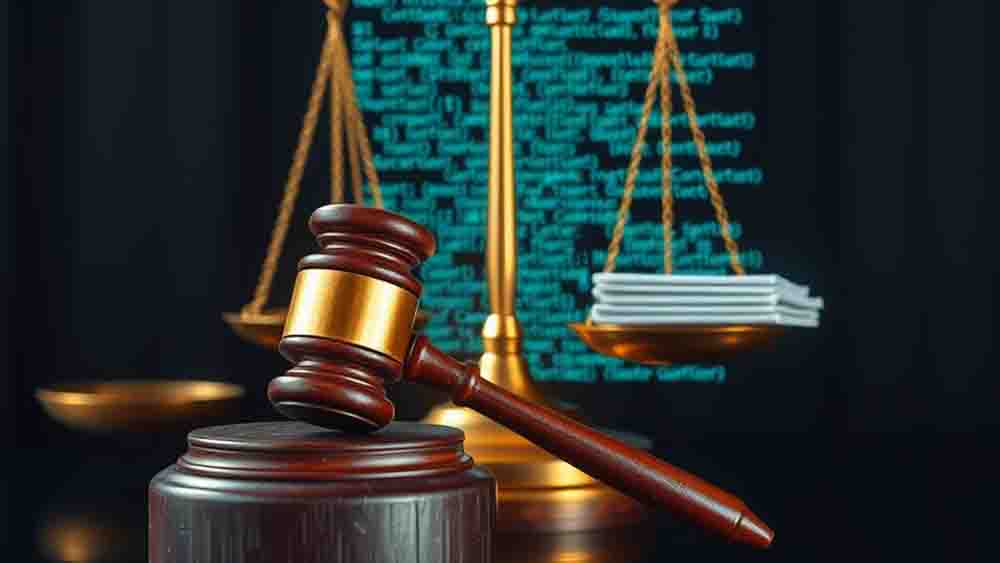5 Key Regulatory Hurdles Facing Blockchain Technology Today
Note: This post may contain affiliate links, and we may earn a commission (with No additional cost for you) if you purchase via our link. See our disclosure for more info. The gold and crypto world is constantly changing. This is not financial, investment, legal, or professional advice. So, please verify the information on the gold and cryptocurrency provider’s websites.
Click below and listen to the podcast on this page.
As you explore the world of blockchain technology, you'll quickly realize that it's not all smooth sailing. The potential for innovation is immense. But, there are big regulatory hurdles to widespread adoption. From jurisdictional inconsistencies to data privacy issues, the blockchain is a maze. But, don't be discouraged. You must know these hurdles. They are essential for anyone wanting to harness this revolutionary technology. So, what exactly are these regulatory roadblocks, and how do they impact the future of blockchain?
Key Takeaways
- Jurisdictional inconsistencies create regulatory uncertainty and compliance challenges across different countries.
- Data privacy regulations, particularly GDPR, conflict with blockchain's immutable nature.
- Securities regulations struggle to define and classify blockchain-based assets, impacting industry growth.
- Anti-money laundering measures require robust KYC processes and sophisticated monitoring systems.
- Smart contracts face legal ambiguity regarding their status, liability, and remedies for errors.
Jurisdictional Inconsistencies
Frequently, blockchain technology faces significant regulatory challenges due to jurisdictional inconsistencies. As distributed ledger technology operates across borders, you'll find that each network node may be subject to different legal requirements. This creates a complex regulatory landscape for global enterprises seeking to adopt blockchain solutions, particularly in the financial services sector.
The jurisdictional issues stem from:
- Varying regulations on blockchain and cryptocurrencies across countries
- Lack of centralized administration in blockchain systems
- Classification challenges for blockchain applications
These factors contribute to regulatory challenges that complicate compliance requirements for organizations. For instance, a blockchain application might be classified as a security in one jurisdiction and a commodity in another, leading to uncertainty about which rules apply.
To navigate these hurdles, you'll need to:
- Stay informed about evolving regulatory frameworks
- Adapt your blockchain strategies to align with different legal standards
- Implement robust compliance measures
As the regulatory landscape continues to develop, it's essential for you to understand and address these jurisdictional inconsistencies. By doing so, you'll be better positioned to leverage blockchain technology while meeting diverse legal requirements across global markets.

Data Privacy Compliance
Tackling data privacy compliance presents a significant challenge for blockchain technology. The immutable nature of blockchain conflicts with data protection regulations like the GDPR, which requires the right to be forgotten and strict data access protocols.
You'll need to navigate the complexities of balancing personal data retention on the blockchain with regulatory requirements for data deletion and consent.
To guarantee data privacy compliance while maintaining blockchain integrity, consider implementing:
- Encrypted data storage to protect sensitive information
- Restricted access mechanisms to control who can view and modify data
- Privacy controls to manage personal data in line with regulatory standards
Private and hybrid blockchains offer potential pathways for compliance by allowing controlled data access while still leveraging blockchain's transparency features.
These solutions can help you meet GDPR requirements for managing personal data on the blockchain.
Implementing RegTech solutions can streamline compliance processes and help you stay on top of evolving data protection regulations.
Securities Regulations
While data privacy concerns are significant, securities regulations pose another major hurdle for blockchain technology. The classification of many tokens and digital assets as securities has created a complex landscape for businesses to navigate. Companies must now grapple with compliance issues, including registration and disclosure obligations set by authorities like the SEC.
The lack of clear definitions for blockchain-based assets has led to uncertainty in the industry. Businesses struggle to determine whether their offerings fall under securities regulations or other categories, such as commodities. This ambiguity complicates innovation and growth in the sector.
Regulatory frameworks specific to blockchain and digital assets are still developing, with many jurisdictions taking a cautious approach. This evolving landscape makes it challenging for organizations to innovate while remaining compliant.
Additionally, compliance with anti-money laundering (AML) regulations is essential, as regulators scrutinize how blockchain technology can be used to circumvent traditional financial controls.
To address these challenges, federal oversight for stablecoin arrangements has been recommended. This indicates a growing regulatory focus on ensuring consumer protections and preventing fraud in the rapidly evolving digital asset landscape.
As the industry continues to mature, achieving legal clarity will be vital for its long-term success.

Anti-Money Laundering Measures
Anti-Money Laundering (AML) measures stand out as one of the most significant regulatory challenges for blockchain technology. As cryptocurrencies gain popularity, regulatory bodies worldwide are intensifying their scrutiny of blockchain projects to prevent illicit activities.
You'll find that compliance with AML regulations is becoming increasingly complex, requiring robust measures to be implemented.
To meet these regulatory demands, blockchain entities must:
- Conduct thorough Know Your Customer (KYC) checks
- Record and share transaction information for amounts exceeding certain thresholds
- Implement sophisticated monitoring systems to detect suspicious activities
The Financial Action Task Force (FATF) has issued guidelines compelling virtual asset service providers to adhere to strict AML standards.
In the U.S., the Financial Crimes Enforcement Network (FinCEN) classifies many blockchain companies as money services businesses, subjecting them to rigorous compliance and reporting obligations.
However, the decentralized and pseudonymous nature of cryptocurrencies presents unique challenges for regulators. Effective monitoring and enforcement of AML measures can be hindered by these inherent features of blockchain technology.
As the industry evolves, you'll need to stay informed about changing regulations and adapt your compliance strategies accordingly to navigate this complex regulatory landscape successfully.
Smart Contract Legal Status
Smart contracts present a new frontier in regulatory challenges for blockchain technology. As these digital agreements gain popularity, their legal status remains ambiguous due to differing jurisdictions. This uncertainty makes it difficult to determine which legal frameworks apply to their execution and enforceability.
Key issues facing smart contracts include:
- Liability and accountability: Multiple parties, such as developers, users, and custodians, may be involved in a smart contract. This complicates liability issues when contracts fail or encounter problems.
- Coding errors and design flaws: Smart contracts can contain bugs or oversights, highlighting the need for clear legal guidance on liability and remedies for affected parties.
- Regulatory guidance: Existing laws may not adequately address the unique characteristics of smart contracts, necessitating new regulatory frameworks.
- Varying recognition: The acceptance of smart contracts as legally binding agreements differs across regions, impacting their adoption and implementation in various industries.
To overcome these hurdles, regulators must work towards developing thorough guidelines that address the complexities of smart contracts.
This will help guarantee their widespread adoption while protecting users and maintaining legal integrity within the blockchain ecosystem.

Frequently Asked Questions
What Are Some Key Problems With Blockchain Currently?
You'll find several key problems with blockchain technology today:
- Scalability issues limit transaction speeds and network capacity.
- High energy consumption, especially for proof-of-work systems.
- Lack of interoperability between different blockchain networks.
- Complexity that creates barriers to widespread adoption.
- Vulnerability to 51% attacks in some implementations.
- Challenges with key management and recovery.
- Limited privacy, as transactions are typically public.
- Regulatory uncertainty in many jurisdictions.
- Difficulty integrating with existing legacy systems.
These hurdles need to be addressed for blockchain to reach its full potential.
What Is the Current Obstacle for Blockchains?
You're facing several obstacles with blockchain technology today.
The main hurdle is regulatory uncertainty. You'll find that many organizations hesitate to fully adopt blockchain due to unclear legal frameworks.
You're also dealing with fragmented compliance requirements across different jurisdictions, making implementation complex.
Additionally, you're encountering challenges in reconciling blockchain's immutability with data protection laws like GDPR.
What Significant Hurdle Does Blockchain Encounter?
Blockchain faces a significant hurdle in the form of regulatory uncertainty.
You'll find that the lack of clear legal frameworks creates challenges for blockchain adoption. This uncertainty affects areas like data protection, financial compliance, and smart contract validity.
You're likely to encounter issues with conflicting regulations across different jurisdictions, making it difficult to implement blockchain solutions globally.
The technology's rapid evolution also outpaces regulatory developments, leaving many aspects of blockchain use in a legal gray area.
What Are the Challenges of Blockchain in Government?
You'll find that governments face several challenges when implementing blockchain technology.
These include:
- Creating regulations for a borderless system
- Dealing with the lack of standardized protocols
- Determining the legal status of blockchain-stored documents
- Ensuring compliance with existing laws like data protection
- Keeping up with the rapidly evolving technology
Each of these hurdles requires careful consideration and ongoing dialogue between regulators and innovators.
As you navigate these challenges, you'll need to balance innovation with the need for effective oversight and public protection.

Conclusion
You've now seen the key regulatory challenges facing blockchain technology. These hurdles aren't insurmountable, but they require careful navigation. As you consider blockchain adoption, it's essential to stay informed about evolving regulations. By knowing these issues, you'll be ready to use blockchain's potential while ensuring compliance. Regulatory clarity will likely improve over time. It may reveal more opportunities in this transformative technology. As you explore blockchain for your business or investments, keep these challenges in mind.











